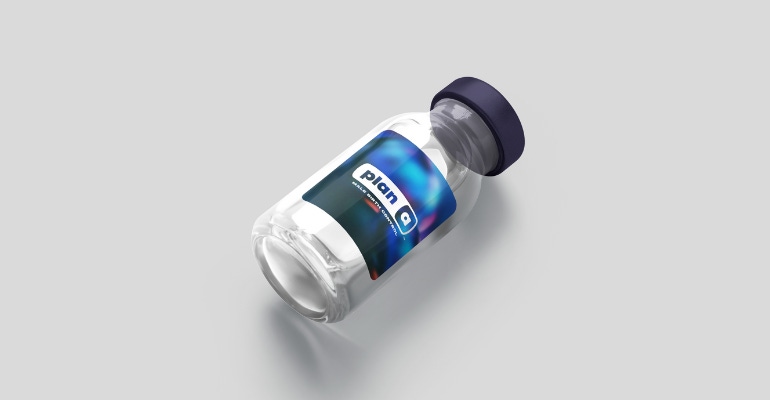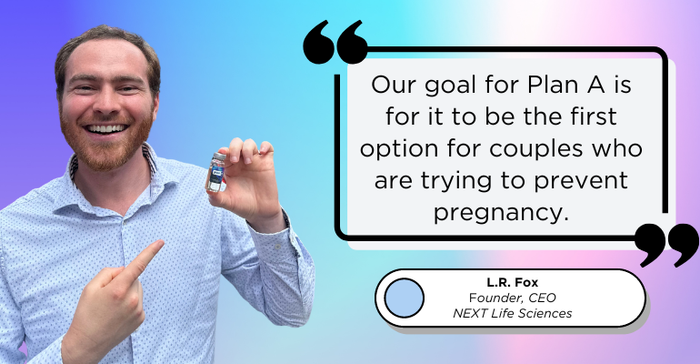‘Plan A’ Offers a New Option in Male Birth Control
Founder and CEO L.R. Fox discusses what happens when people aren’t able to choose if/when to have a child and how he founded NEXT Life Sciences and Plan A to increase access to family planning.

Recently, MD+DI sat down with L.R. Fox, founder and CEO of NEXT Life Sciences, to discuss Plan A, a non-hormonal, long lasting, and reversible male contraception option that uses Vasalgel as a medical device to block the flow of sperm within the vas deferens for up to 10 years to prevent pregnancy. Highlighting the burden of birth control usually placed on women, Fox noted that Plan A would give men an option other than condoms or a vasectomy to play an active role in birth control and family planning.

Can you please explain the thought process behind Plan A and what you hope to accomplish?
Fox: My background is in building companies in highly regulated spaces and delivering new solutions to markets that don’t already exist. At the same time, what’s been near and dear to my heart is how we can solve some of society’s most systemic problems and create the most opportunity for people to live better lives.
As a child, I grew up in the foster care system. I saw firsthand the devastating consequences of what happens when people aren’t able to choose if and when to have a child. That’s what ultimately led me on the path toward founding NEXT Life Sciences and Plan A. I believe that the more we invest in family planning and enable people to easily make the choice of if and when to have a child, the more we can set them up for success.
For too long, the burden of family planning has rested on women. But we’re seeing now, especially with the political landscape in the US today, that men are more interested than ever in taking an active role in family planning. Our goal for Plan A is for it to be the first option for couples who are trying to prevent pregnancy.
Plan A is considered a medical device and not a pharmaceutical. Why?
Fox: Plan A is a medical device, not a pharmaceutical, because it works via occlusion of the vas deferens as opposed to via chemical action. It utilizes a hydrogel to create a flexible filter to filter out sperm, while letting other ejaculate pass through.
Plan A is intended to be administered during a quick outpatient procedure where our proprietary hydrogel, Vasalgel, is injected into the vas deferens (the tubes that carry sperm) to create a flexible filter that blocks the flow of sperm within the vas to prevent pregnancy. Since Plan A does not achieve its primary intended purpose through chemical action within or on the body, it is not a pharmaceutical. The design’s intent is to create up to 10 years of pregnancy prevention, with the hydrogel having the capability to be dissolved at any time through another outpatient procedure.
The device does not currently have clinical trial or marketing approval.
What is Vasalgel? Can you please explain the process for inserting the Vasalgel. How long does the procedure take? What is used for pain management?
Fox: Plan A is derived from contraceptive technologies that have been around and in development for more than 40 years now. Starting in the 1970s, scientific research in India led to the development of a method of male birth control called RISUG (Reversible Inhibition of Sperm Under Guidance).
About 10 years ago, a non-profit called the Parsemus Foundation created an optimized version of this hydrogel called Vasalgel and NEXT has acquired the exclusive patent to Vasalgel, which is the proprietary hydrogel used in Plan A.
For pain, our goal is to ensure a quick and painless procedure that is less painful than a traditional vasectomy. Our design would include a doctor using a local anesthetic to numb the injection area, and then inject the hydrogel into the vas deferens. Due to the reduced pressure on the epididymis in this procedure compared to that of traditional vasectomy, we anticipate a quicker and near painless recovery from the placement procedure.
Why should a patient consider a product like this instead of a vasectomy?
Fox: We’re seeing greater interest from US men in taking an active role in preventing pregnancy. Right now, the primary options for male contraception are to simply use a condom or to get a vasectomy — two opposite sides of the spectrum. Whereas Plan A is intended to be a long-lasting, and completely reversible method of birth control that lasts for up to 10 years.
Vasectomies, while effective, are not reversible 100% of the time, and are really designed for men who are “child-complete.” Plan A is being developed to be fully reversible, making it an option for men regardless of where they are in their parenting journey. Any patient interested in a long-acting, reversible, non-hormonal contraceptive is the ideal candidate for Plan A.
When seeking FDA approval, will you be taking the 510(k) or PMA pathway? When do you hope to submit a proposal for FDA approval?
Fox: Right now, we’re preparing for clinical trials in the US, which we plan to be in before the end of 2023. The FDA review pathway is not yet determined, though we will be engaging with FDA throughout the clinical development process to gain alignment on nonclinical and clinical data requirements, as well as a likely review pathway.
What is your hope for the future?
Fox: In the future, I hope that men have access to workable birth control solutions, including non-hormonal and long-acting, reversible models that enable them to share the burden of family planning. I believe that Plan A will be a groundbreaking advancement for contraceptive access and a milestone for equity in reproductive health. Ultimately, with the potentially new layer of choice provided by an option like Plan A, we hope to become couples’ first choice as they begin thinking about family planning.
About the Author(s)
You May Also Like



.png?width=300&auto=webp&quality=80&disable=upscale)
